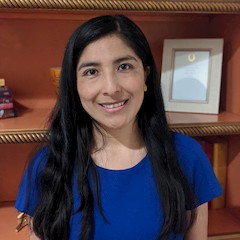 Liliana Mamani Condori Liliana Mamani Condori
Liliana Mamani Condori Liliana Mamani Condori
Liliana Mamani Condori
LLM, BC Law '19, and MTS, School of Theology and Ministry '17
.jpg)
In my current work at the Low Income Tax Clinic, my skills and interdisciplinary lens developed in the certificate program allow me to see how my pastoral training and legal training both come into play for the client in front of me.
Describe your current work/studies:
I am currently working at the Low Income Tax Clinic of the Employment Law Unit in Greater Boston Legal Services. I primarily assist immigrant and low-income families with cases involving tax controversies with the federal and state governments.
How did the Center's certificate help prepare you and/or qualify you for the work/career you are currently engaged in?
The interdisciplinary nature of the certificate allowed me to take courses outside of my primary discipline of Theology at that time. I shared a class with students from different fields with a shared commitment to human rights. Our interdisciplinary conversations allowed me to explore a common issue from different perspectives and reaffirm that a collaborative effort is needed to fulfill human rights for all. These conversations also helped me to be mindful of how a human rights violation affects various dimensions of the person. In my current work at the Low Income Tax Clinic, my skills and interdisciplinary lens developed in the certificate program allow me to see how my pastoral training and legal training both come into play for the client in front of me.
Advice for today's students considering the program:
When we think about human rights abuses, our mind goes to somewhere else in the world, far away from home. While waiting for opportunities that would take us to serve in those places, we often miss the needs of our immediate community. Through my work, I have become more aware of the acute needs of those in Boston. Our own context demands work and care to protect the fundamental rights of those around us, and each one of us is called to action that could effect change for and from where we are today. Be mindful of your own reality, and do not underestimate the value of each action you might take to foster fulfillment of human rights.
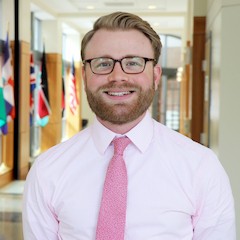 Chris Bauer Chris Bauer
Chris Bauer Chris Bauer
Chris Bauer
Director, Center for Justice and Peace, St. John's Prep, Danvers, MA / Master of Theological Studies, School of Theology & Ministry, 2015
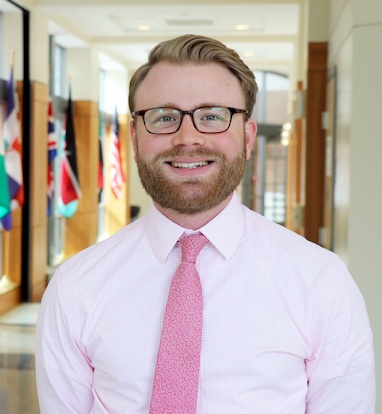
The certificate program was essential in leading me towards the work I do today. At the most basic level, the program helped qualify me for my for my current position because it was a part of the educational background needed to effectively serve in my role as director. Most importantly, the program allowed for me to approach issues of human rights and international justice through an interdisciplinary lens, which has provided me with the language to engage these issues in a variety of arenas outside of Catholic theology, my particular area of expertise. This has allowed for me to be both a better teacher and center director because I am able to help students and teachers connect themes of justice to different fields of study found across the curriculum.
Advice for today's students:
I believe that it is important to provide opportunities for younger people to develop knowledge of current issues and discern how to be strong advocates for justice. Many of my students will grow into adults with a fair amount of power (socially, economically, etc.) and I hope they have experiences early on that push them towards a life that works for greater justice in the world. In my experience, many people study human rights and international justice with careers in mind that have an immediately visible international impact. While careers that engage human rights and justice issues at the national or international level are essential, I think it is also important that we consider ways to impact these issues at the local level. Working in a high school was not what I had envisioned while in the program but it has certainly allowed for me to continue the work that I enjoyed as a student.
About the Center for Justice and Peace at St. John's:
One of our four Centers for Mission and Research, the Center for Justice and Peace opened at the start of the AY19 academic year and serves as the hub on campus for campus initiatives that promote justice and peace. New programs include: an interdisciplinary senior capstone program, a summer study abroad program, a speaker series, and various professional development opportunities for teachers. Its work relates closely to that of the CHRIJ in that it works to provide a myriad of opportunities for students, faculty, staff, parents, and alumni to learn about and engage issues of human rights and international justice from a variety of perspectives.
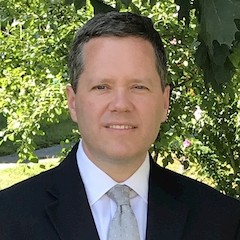 Jim West Jim West
Jim West Jim West
Jim West
PhD Student in Higher, Adult, and Lifelong Education at Michigan State U. / MA in Higher Education Administration, Lynch School of Education & Human Development, 2012
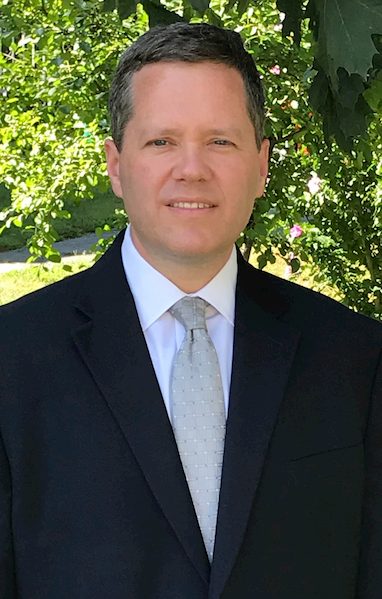
"Absolutely pursue the certificate...Take advantage of the interdisciplinary nature of the program...[T]o overcome some of the world’s most dire problems, it will require new thinking, collaborative work, and the ability to bridge divides and link seemingly disparate ideas."
Describe your current work/studies:
I am currently completing my Ph.D. In higher, adult, and lifelong education from Michigan State. My work broadly centers on international education. Questions pertaining to human rights and international justice permeate this field. I’ve been interested in how university presidents present international partnerships, particularly when partnerships are questioned on human rights grounds.
How did the Center's certificate help prepare you and/or qualify you for the work/career you are currently engaged in?
The opportunity to interact with the fantastic faculty and students also pursuing the certificate was inspirational. I often think back to some of the conversations in class. In the classes, I tried to allow myself to think differently and adopt new ideas. Sometimes that would lead me in new directions, other times it fortified my original stance. That process is useful as a reflective exercise to understand your own biases and as a scholarly one to challenge your own analysis.
Advice for today's students considering the program:
Absolutely pursue the certificate. It adds a credential to your résumé/CV that can separate you from other applicants regardless of your career plan. In the courses, take advantage of the interdisciplinary nature of the program. Unfortunately, there is not an abundant amount of opportunities to have conversations across disciplinary boundaries. But to overcome some of the world’s most dire problems, it will require new thinking, collaborative work, and the ability to bridge divides and link seemingly disparate ideas.
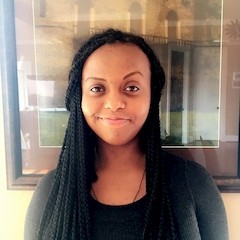 Makeda Eshete Makeda Eshete
Makeda Eshete Makeda Eshete
Makeda Eshete
Special Assistant to the Vice President of the Federal Supreme Court of Ethiopia / LLM, BC Law School, 2017
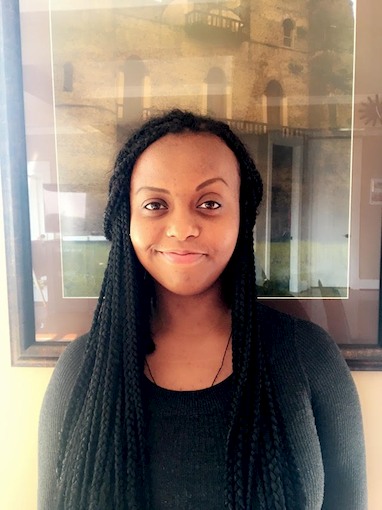
The certificate allowed me to critically examine the principles and ideas of human rights from different perspectives, not just to take everything at face value.
Describe your current work:
My work constitutes working with the judicial reform team and various activities related to the judicial reform. Ethiopia is currently going through a transition politically, and we are trying to become a democratic country. As part of the transitional process, judicial sector reform is being undertaken by the government. I work with the reform team on developing a framework for the judiciary and the justice sector that will institute the principles of rule of law and protects the human rights and freedom of the Ethiopian people.
How did the Center's certificate help prepare you and/or qualify you for the work/career you are currently engaged in?
The certificate allowed me to critically examine the principles and ideas of human rights from different perspectives, not just to take everything at face value. At my current work, the certificate program definitely allowed me to think outside of the usual spectrum than those around me when it comes to justice or the basic rights of people. It helped me challenge the usual thinking or the norm, especially with regard to the reform plan that I'm working on.
Advice for today's students considering the program:
I think when someone chooses to work in areas of human rights, it is essential to have a connection and feel strongly about the area or issue the person wants to focus on. It will become the necessary drive to pursue whatever area or issue you are interested in because a career in human rights can be very stressful and disheartening when you see all the injustice that surrounds us.
 Rachel Hershberg Rachel Hershberg
Rachel Hershberg Rachel Hershberg
Rachel Hershberg
Assistant Professor of Community and Applied Developmental Psychology, School of Interdisciplinary Arts & Sciences, U. of Washington Tacoma / PhD in Applied Developmental Psychology, LSOEHD, 2012
.jpg)
The classes and content you will engage in throughout your certificate program will help you become a better student, but also a better person in the world.
Describe your current work:
I am currently co-leading a community-based research project entitled “Displacement, Detention, and Integration of Immigrants and Refugees in the South Sound” - Phase Two. This project is a collaboration with four community-based organizations in Tacoma. We are systematically documenting the impact of having the fourth-largest detention center in the country in our backyard on immigrant and refugee families and communities, as well as college students at UWTacoma and developing initiatives to advocate for the protections of immigrant rights in Tacoma and beyond. We (including community partners) presented some initial findings from our research at an event we held with UWSeattle’s Center for Human Rights entitled “Unequal Justice: Immigrant Rights, Detention, and Advocacy in Pierce County.” (More information on the flyer here.)
How did the Center's certificate help prepare you and/or qualify you for the work/career you are currently engaged in?
The Center and certificate provided my foundational education in human rights and international justice. They also supported my research during my graduate training which was also focused on immigrant rights, detention, and impacts of the current sociopolitical climate on transnational families and communities. In the context of my certificate classes and with research training from my advisor Dr. Brinton Lykes, I also learned and experienced the benefit of conducting action-oriented research with interdisciplinary colleagues and stakeholders from inside and outside the university. I have brought these experiences and skills with me in my current project, which I co-lead with a colleague in Spanish, Language, and Cultural Studies.Advice for today's students considering the program:
Advice for today's students considering the program:
The classes and content you will engage in throughout your certificate program will help you become a better student, but also a better person in the world. Learn theory well but take advantage of opportunities to conduct work in the field where you can apply your knowledge and skill set to working with people and communities, especially those who may experience human rights violations (or who have in their past).
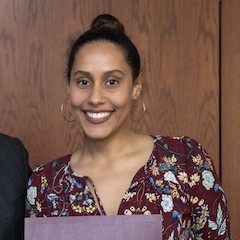 Ammy Sena Ammy Sena
Ammy Sena Ammy Sena
Ammy Sena
Mental Health Counselor, Bryant University / MA in Mental Health Counseling, Lynch School of Education & Human Development, 2018
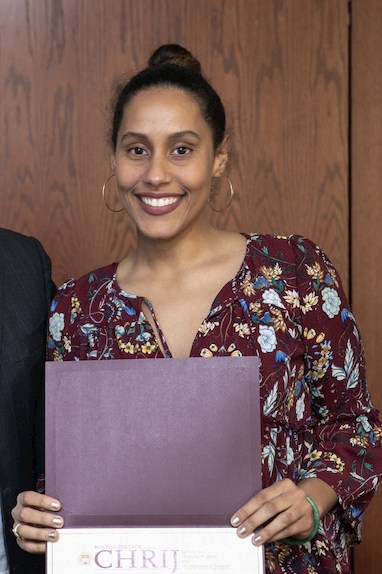
The certificate gave me a more global perspective than I might have gotten just from my Master's degree curriculum.
Describe your current work:
My primary role at Bryant is to outreach to students of color both international and domestic and provide mental health services. A lot of students have stories that are very much impacted by issues related to oppression and racism. Additionally I provide training and consultation on working with students of color and of minoritized cultures.
How did the Center's certificate help prepare you and/or qualify you for the work/career you are currently engaged in?
I believe the certificate gave me a more global perspective than I might have gotten just from my Master's degree curriculum. It required coursework that provided knowledge in politics and international issues to my curriculum.
Advice for today's students considering the program:
Find faculty within your home academic department who can help you continue the conversations learned from courses in this certificate. This can help stimulate more critical thinking and help you to see how the certificate can complement your field.
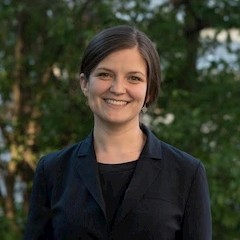 Kelly Morgan Kelly Morgan
Kelly Morgan Kelly Morgan
Kelly Morgan
Staff Attorney at Central West Justice Center, Immigration Unit / MSW, School of Social Work, 2017 and JD, Law School, 2018
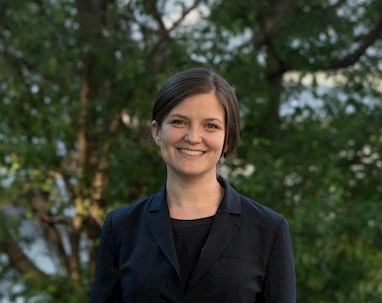
In my work, I often collaborate with social workers, psychologists, anthropologists, etc., particularly in preparing asylum cases, and I have found that the certificate program was a great foundation for this interdisciplinary work.
Describe your current work:
I work as an immigration attorney at a legal aid nonprofit in Worcester, MA. I primarily represent clients in applying for various humanitarian visas and forms of relief from deportation.
How did the Center's certificate help prepare you and/or qualify you for the work/career you are currently engaged in?
The greatest value of the certificate program for me were the opportunities to hear from students in departments other than my own who are interested in the same issues, yet who are approaching them from such different directions. In my work now, I often get to collaborate with social workers, psychologists, anthropologists, etc., particularly in preparing asylum cases, and I have found that the certificate program was a great foundation for this interdisciplinary work.
Advice for today's students considering the program:
Do as much language studies and immersion as you can while you're in school!